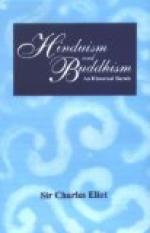The Emperor became furious when he read the memorial and wished to execute its author on the spot. But Han-Yu’s many friends saved him and the sentence was commuted to honourable banishment as governor of a distant town. Shortly afterwards the Emperor died, not of Buddhism, but of the elixir of immortality which made him so irritable that his eunuchs put him out of the way. Han-Yu was recalled but died the next year. Among his numerous works was one called Yuan Tao, much of which was directed against non-Confucian forms of religion. It is still a thesaurus of arguments for the opponents of Buddhism and, let it be added, of Christianity.
It is not surprising that the prosperity of the Buddhist church should have led to another reaction, but it came not so much from the literary and sceptical class as from Taoism which continued to enjoy the favour of the T’ang Emperors, although they died one after another of drinking the elixir. The Emperor Wu-Tsung was more definitely Taoist than his predecessors. In 843 he suppressed Manichaeism and in 845, at the instigation of his Taoist advisers, he dealt Buddhism the severest blow which it had yet received. In a trenchant edict[668] he repeated the now familiar arguments that it is an alien and maleficent superstition, unknown under the ancient and glorious dynasties and injurious to the customs and morality of the nation. Incidentally he testifies to its influence and popularity for he complains of the crowds thronging the temples which eclipse the imperial palaces in splendour and the innumerable monks and nuns supported by the contributions of the people. Then, giving figures, he commands that 4600 great temples and 40,000 smaller rural temples be demolished, that their enormous[669] landed property be confiscated, that 260,500 monks and nuns be secularized and 150,000 temple slaves[670] set free. These statistics are probably exaggerated and in any case the Emperor had barely time to execute his drastic orders, though all despatch was used on account of the private fortunes which could be amassed incidentally by the executive.
As the Confucian chronicler of his doings observes, he suppressed Buddhism on the ground that it is a superstition but encouraged Taoism which is no better. Indeed the impartial critic must admit that it is much worse, at any rate for Emperors. Undeterred by the fate of his predecessors Wu-Tsung began to take the elixir of immortality. He suffered first from nervous irritability, then from internal pains, which were explained as due to the gradual transformation of his bones, and at the beginning of 846 he became dumb. No further explanation of his symptoms was then given him and his uncle Hsuan Tsung was raised to the throne. His first act was to revoke the anti-Buddhist edict, the Taoist priests who had instigated it were put to death, the Emperor and his ministers vied in the work of reconstruction and very soon things became again much as they were before this great but




